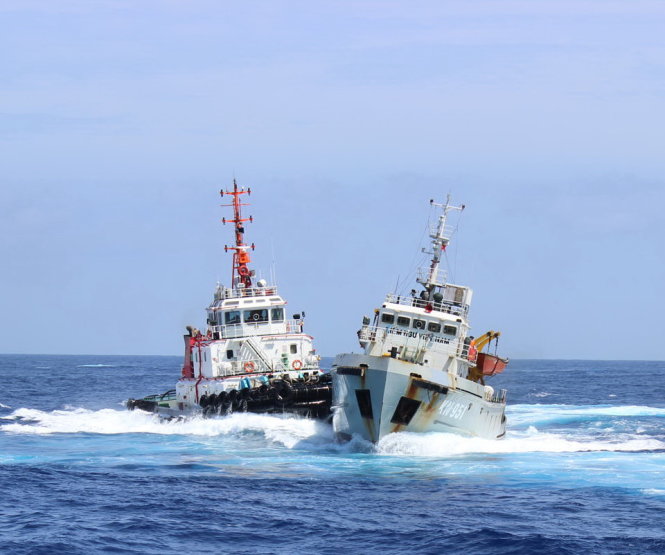Editor’s note: Nguyen The Phuong, a 24-year-old researcher on international issues from Ho Chi Minh City, visualizes that a generation of young, dedicated Vietnamese scholars would help reiterate their country’s maritime sovereignty in his submission to the “Ky Vong Viet Nam 20 Nam Toi” (“My Expectations for Vietnam in 20 Years”) writing contest.
As a young researcher on international issues, I dream that in the 20 years to come, a batch of young, committed academics would help better defend Vietnam’s sovereignty and make the country’s voice be heard in regional and global arenas.
International relations intellects are integral to helping the state shape its course of action in response to crucial foreign relations issues, particularly in safeguarding the country’s sovereignty over the East Vietnam Sea.
The field is not new in Vietnam, but it is quite particular about its following, who are required to have in-depth knowledge.
The academic front is ‘out of tune’
Regarding force, Vietnam is currently under considerable pressure from China’s “academia” and “media.”
Beijing has set up many academic centers which focus single-mindedly on defending its benefits in the waters which they call the “South China Sea.” Hundreds of Chinese scholars have been sent across the world on the lookout for data and evidence to cement their arguments, which are “out of tune” and mostly unnatural and ridiculous. In addition, these Western-trained experts have publicized their academic writings in English with the purpose of disseminating their feeble arguments about Chinese sovereignty. With a lack of counter-arguments in English by Vietnamese experts available, it is no wonder that our orthodox points of view are not approached by international friends.
A notable trend observed in recent times has seen a number of Western scholars backing up China’s standpoints and presenting their articles at important foreign relations forums.
To tell the truth, if Vietnam does not form an effective strategy right now, our academic frontline will face formidable challenges from Chinese waves in the near future.
‘The power of East Vietnam Sea knowledge’ needs to be built
A strategy to build “the power of East Vietnam Sea knowledge” is supposed to be a medium- and long-term strategy, which requires related parties’ joint efforts, particularly the awareness of various social components.
At present, many positive factors have emerged on the information front. Groups of local researchers have made use of their powerful contacts and forged liaisons to reject China’s allegations at international forums. However, these efforts remain individual and lack precision or systematic, widespread links.
Vietnamese scholars’ tardiness compared to their Chinese counterparts comes down to three elements: (1) A shortage of specialized research facilities, (2) a lack of mechanisms to have scholars’ voices heard in international arenas, and (3) investment in research is still allocated disproportionately, with most resources focused on “to be put away” projects.
Are the efforts exerted by individuals or a few research units out of proportion with the image of a country which aspires to reach out to the sea?
What we desperately need is not limited to scientific articles published in prestigious journals and astute policy articles to refute China’s one-sided, distorted arguments, but also inventions, initiatives and inter-sector liaisons related to the sea and sea research.
Therefore a medium- and long-term plan to train accomplished scholars needs substantial investment from the state regarding funding and infrastructure so as to build specialized, prestigious inter-field research centers across the country.
These centers will also help scholars exchange experiences and come to one another’s assistance.
In addition, the government should also set up liaison mechanisms to fully tap into local scholars’ grey matter capacity.
Such auspicious conditions include adopting a better salary and bonus system; allowing more freedom in voicing one’s opinions; setting up research funds; and, most importantly, creating ‘incubators’ with a number of well-performing research groups taking the central role.
These ‘incubators’ will not only help intellectuals perfect themselves but also create a professional, nourishing “academic culture.” Academics on the East Vietnam Sea are supposed to constantly improve their expertise, cement their knowledge and hone their skills, particularly their command of foreign languages.
The key to triumphant combat on the international academic frontline is a mastery of the English language. In actuality, a number of local scholars at research centers remain inadequate in foreign languages.
It’s evident that East Vietnam Sea issues are no longer solved in a “self-contained” way on an international scale like in previous years.
With solid expertise, an adequate command of foreign languages, and steadfastness, a new batch of East Vietnam Sea scholars will be on a par with their Chinese counterparts on the academic front and in the international arena of public opinion.
| “Ky Vong Viet Nam 20 Nam Toi” is a competition organized by the World Bank in Vietnam and Tuoi Tre (Youth) newspaper that encourages local youths to write down their wildest, yet feasible, dreams about how Vietnam will change in 20 years’ time. |



















































